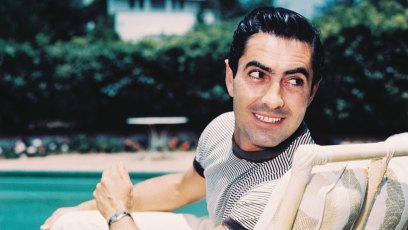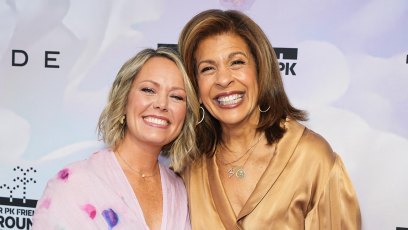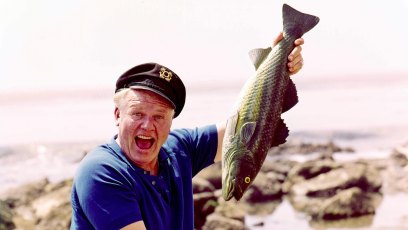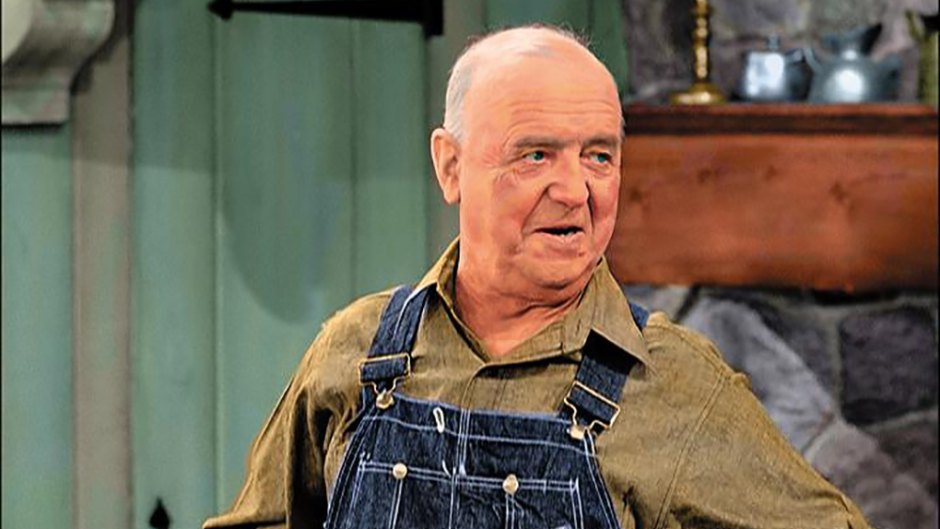
CBS Television Distribution
Here’s What Happened to William Frawley Before, During and After Playing Fred Mertz on ‘I Love Lucy’
If there is one person from the cast of Classic TV sitcom I Love Lucy who seems to remain a mystery all these years later, it would be actor William Frawley, who played Fred Mertz, husband of Ethel (Vivian Vance) and best friend to Lucy and Ricky Ricardo (Lucille Ball and Desi Arnaz). When that show ended its run, Bill did move on to My Three Sons where he was beloved, but people nonetheless know so little about him — which is particularly unfortunate when you consider the longevity of his career.
Stanley Livingston — who, as a child actor, played “Chip” Douglas to Bill’s “Bub” on My Three Sons — explains to Closer Weekly in an exclusive interview, “I have no idea what he was like when he was younger, but by the time I met him I guess he was already in his early 70s. I knew him from being a kid and watching TV, especially I Love Lucy. Never in my wildest dreams did I think I’d be working with him. When I was hired on My Three Sons and then found out he was going to be the grandfather, I was blown away. I wasn’t sure how he would be; I just knew I liked him. In fact, he was my favorite character on I Love Lucy — I just liked his weird grumpiness, which I thought was funny. And what you saw on the show pretty much mirrored what he was like in real life. Minus the four-letter words.”
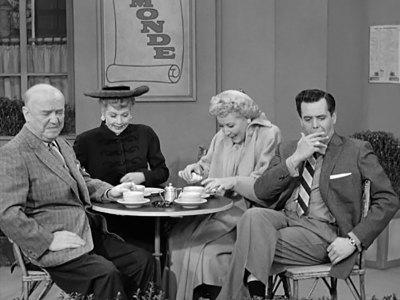
“He was a guy out of the Depression,” comments Barry Livingston, who played Ernie Douglas on My Three Sons and wrote his memoir, The Importance of Being Ernie. “He was a hard, hard nut and didn’t take any gruff from anybody, and it was shocking that he got away with a lot of the shenanigans that happened as soon as he got up in age. That was mainly the alcohol consumption, but he was also a big prankster and he was genuinely fun.”
In reflecting on Bill, Geoffrey Mark, often referred to as a walking encyclopedia of show business history, and author of The Lucy Book and Ella: A Biography of Legendary Ella Fitzgerald, offers, “His story is a sad one. You have to keep in mind who he was, what he came from and how he felt about I Love Lucy. With William Frawley at the time, we have a man who is in his early 60s. He has been in a hundred films. He’s been on radio. He has been on the vaudeville stage, first with his wife Louise, the only wife he ever had, who broke up with him years and years and years earlier. He had been a handsome song and dance man. He had introduced the songs ‘Carolina in the Morning’ and ‘My Melancholy Baby.’

“He’d just made a big Bob Hope film [The Lemon Drop Kid], but he’s beginning to get a reputation for being an alcoholic and undependable,” he continues. “The parts aren’t as many as they used to be, which happens anyway. In show business, you reach a certain age and they just don’t have as many old man parts as they have young man parts.”
“So he reads in the trades that I Love Lucy is happening,” Geoffrey adds. “The pilot had been made and there was no Fred and Ethel; they weren’t characters yet. He, of course, had listened to the radio show My Favorite Husband, from which I Love Lucy was born, so he knew there was an older couple and he knew that they were using My Favorite Husband as the paradigm on which to build.”
Scroll to take an exclusive look at William’s incredible career.
1 of 30

CBS Television Distribution
What He Brought to the Table
Bill was also aware that Gale Gordon, who Lucille wanted to play Fred Mertz, was unavailable due to his success on radio and a starring role on the radio series Our Miss Brooks, which he wouldn’t trade for the $250 a week I Love Lucy would have paid. “So Bill calls Desi Arnaz and says, ‘Why haven’t you considered me?’” Geoffrey elaborates on the scenario, “and Desi does take a lunch meeting with him and they talk. Bill had worked with Lucille Ball before and certainly everybody in town knew him. He was a Hollywood staple from the 1930s on. He was a well known entity, though not necessarily a household name. And Bill says to Desi, ‘What have these other guys who you’re considering got that I haven’t?’ Desi’s answer was, ‘It’s not what they have that you don’t have, it’s what they don’t have that you do: your alcoholism. I’m putting my money into this and I can’t afford to miscast.’”
2 of 30

CBS Television Distribution
Coming to An Arrangement
“Now,” he emphasizes, “we have to be real and honest about this, because everybody else gets it wrong: Desi was not yet the producer of the show, okay? He was the president of the production company, but he didn’t produce I Love Lucy, he didn’t write it, he was not yet in charge of it. Jess Oppenheimer, who created the show, was. But Desi took this meeting with Bill, because Bill went to Desi directly and they batted the thing around for a while over drinks — certainly some irony there. And they come up with an arrangement with Jess Oppenheimer’s approval.” That arrangement was that Bill Frawley could play Fred Mertz, but the first time he missed anything because he was drunk — could be a line of dialogue, a cue, showing up to rehearsal drunk, coming to filming drunk — he would lose that week’s pay for the first offense. If there was a second, he would be fired and Desi assured him that he would see to it that Bill was blackballed in Hollywood.
3 of 30

Warner Bros
Take Him Out to the Ballgame
Laughs Geoffrey, “Bill said, ‘Here’s my counter-offer: I agree to all of that, but if while I work for you the New York Yankees are in the World Series, you have to get me tickets, you have to send me there first class and put me up.’ They shook hands and the Yankees were in the World Series every year I Love Lucy was on. But the truth is, Bill Frawley was a tremendously talented man and Desi knew he would be an asset to his show. His sardonic point of view of life was perfect for Fred Mertz. At the same time, he was not an easy man to work with. He was very set in his ways, he was Irish Catholic, I believe. He did not have a very strong taste for Jews; he was a little antisemitic. Which is not a good thing if your boss, in this case Jess Oppenheimer, was Jewish. He didn’t like people who weren’t white, which is not a good thing when you’re working for Desi Arnaz. He didn’t particularly care for people. He liked to hang out with his Irish drinking buddies and gambling friends. He was a misogynistic through and through, but if there was a pretty young girl around, he became charming. Otherwise, he couldn’t be bothered. So the writers wrote a lot of that into Fred Mertz, who developed based on the actual personality characteristics Bill Frawley had.”
4 of 30

CBS Television Distribution
Similar Characteristics
“If you tried to get into his mind,” he adds, “he had been a handsome, charming guy. Well, by now he’s in his early sixties, but he looked 80. It took lots of makeup to make Bill Frawley look healthy. His hands tremored; he couldn’t handle a lot of props because his hands shook and you could see it in the shows. It was hard to find good costuming for him, because of his big pot belly. Yet he was perfect for Fred Mertz. Lucille Ball said of him, ‘He was Fred Mertz; he was playing himself.’ He was a wit, as was Fred Mertz. Stingy, as was Fred Mertz. Disrespectful of any female he didn’t think was worth trying to get into bed — he had no use for them otherwise. The antipathy between he and Vivian Vance was written into the show.”
5 of 30

CBS Television Distribution
Ethel and the ‘Old Coot’
That antipathy began on Vivian’s first arrival at the studio where she was told that Bill would be playing her husband, to which she commented, “Husband? That old coot could be my grandfather!” Wanting to prove to everyone that he was going to be reliable, Bill was the first one there that day and overheard her. “He took that one remark,” says Geoffrey, “and ended up hating Vivian Vance with a vengeance that lasted the rest of his life.”
6 of 30

Warner Bros
In the Beginning
That life began on February 26, 1887, when he was born William Clement Frawley in Burlington, Iowa into a very religious Irish Catholic family. He attended Catholic schools and sang in the choir of St. Paul’s Catholic Church. As time went on, he began performing in local theater productions, much to the anger of his mother, who (like Vivian Vance’s mother, actually) thought that acting was the road to sin. His first “real” job was as a stenographer for the Union Pacific Railroad in Omaha, Nebraska, which led to his moving to Chicago, where he worked as a court reporter and scored a singing role in the musical comedy The Flirting Princess — though that was only a tease of what could be as, to appease his mother, he moved to St. Louis, Missouri and began working for a different railroad company.
7 of 30

Warner Bros
Changing Goals
Briefly, he and his brother Paul formed a vaudeville act, which ended when mother called Paul back home. Bill, however, decided to write a script called Fun in a Vaudeville Agency, which he actually sold for $500. Next up was a job as a singer in a Denver café, where he teamed up with pianist Frank Rath. From there the two of them went to San Francisco with an act they called “A Man, a Piano and a Nut” (where he popularized those two previously mentioned songs). By 1925 he was in New York City, performing on Broadway in the show Merry, Merry, shifting to drama in 1932 as a star of Twentieth Century, playing a dramatic role.
8 of 30

Paramount Pictures
The Big Screen
Appearing in several short films, in 1933 he was featured in the Universal musical Moonlight and Pretzels. This resulted in his moving to Los Angeles, where he signed a seven-year contract with Paramount Pictures and found himself immersed in Hollywood. “At that point,” says Geoffrey, “that’s where he began to really be known as a celebrity, because he would go on to make over a hundred films. It was never really ‘William Frawley in…,’ but it was ‘Big Star in … with William Frawley.’ People knew his name, directors knew his name, and that’s why he kept getting work. But by 1951, things are beginning to dry up for him. That’s when I Love Lucy entered his life.”
9 of 30

CBS Television Distribution
TV Challenges
“The reason I described his story as being sad,” he continues, “is that he didn’t really enjoy being on the show. It was hard for him. For a man in his sixties who drinks too much, it’s very difficult for that man to get a script on Monday and have it memorized by Thursday with blocking and sometimes songs and dances that he performed beautifully. It was difficult for him to focus. There were weeks where he’d be staring at a script and Vivian would say, ‘What are you doing?’ and he’d say, ‘I’m looking over my lines.’ And Vivian would turn around and say, ‘Bill, that was last week’s script. We’ve moved on, kiddo.’”
10 of 30

CBS Television Distribution
Unable to Escape Each Other
One point Geoffrey makes is that that kind of thing “just added to the fact that he detested Vivian. Just detested her. He’d call her a sack of doorknobs and other things that I can’t repeat. He hated her singing, he thought she was untalented and unfunny. And then, as time went by, he felt I Love Lucy was repeating itself; that the first few seasons were funny, but after a while for him, as an actor, he was bored in his job. He was making nice money; both he and Vivian got tremendous raises as the show went on and they were doing commercials and getting extra money for that, but he was so tired of this show and being so tied to Vivian. There was even a Shower of Stars, a rotating variety thing, and one of the episodes was a musical about baseball. They hired Vivian Vance and William Frawley to play a husband and wife. They starred in the show, but he felt like he couldn’t get away from her and Vivian just couldn’t understand why this old coot was spending so much of his time against her.”
11 of 30

CBS Television Distribution
Confusion Over Fred and Ethel
Opines Barry Livingston, “I don’t know if he ever confronted her about why he felt the way that he did, but that animosity grew into what became famously a great screen chemistry, if you can call it that, because there was this weird edge in that relationship which, strangely enough, kind of gave it a grounded-in-reality feeling. Why are Fred and Ethel together? They’re sniping at each other constantly and sometimes they say things that sound hurtful, but then again they do seem to get along and get on with life, and they’re still together. They’re stuck with each other. So that was part of what became the I Love Lucy charm, where they loved and hated each other at the same time.”
12 of 30

Tva/Picturegroup/Invision/AP/Shutterstock
Some Win, Some Don’t
When I Love Lucy was winding down its original run, Jess Oppenheimer wanted to make a spinoff in the form of a Fred and Ethel series. Bill wanted the money, but Vivian Vance declined, because she couldn’t stand working with his negativity and foul mouth. “So,” says Geoffrey, “he had the added resentment of that in addition to the fact he didn’t win any Emmy Awards for the show. Desi got one as executive producer, Lucille Ball got two of them, Vivian Vance won one in 1954 [the first person to win in the category of Best Supporting Actress] and was nominated three more times; and Bill was nominated five times, but never won. And he was angry about that. Plus, when the show became the hour-long versions in the late fifties, where 13 were produced, because the show became guest star heavy, Fred and Ethel had less to do and, as time went on, even less.”
13 of 30

Don Fedderson Prods/Kobal/Shutterstock
There’s a Contract?
“What happened next,” he elaborates, “is that Bill had a long term contract with Desilu and ‘disrespected’ his contract and Mr. Arnaz and Ms. Ball by signing to do a sitcom not produced by them, even though he was under exclusive contract to them, and that was for My Three Sons. But Mr. Arnaz looked the other way. His feeling was, ‘How can you be angry at someone who did so much to make our show a success?’ Because Desi felt that everybody, every cog in the wheel, was important to the success of I Love Lucy. So out of gratitude to what Bill brought to the table, he tore up his contract.”
14 of 30

Courtesy Stanley Livingston
‘My Three Sons’ Arrives
My Three Sons was a television-starring vehicle for film actor Fred MacMurray, who plays widower and aeronautical engineer Steve Douglas. Steve is raising his three sons, Mike (Tim Considine), Robbie (Don Grady) and Richard “Chip” Douglas (Stanley Livingston). Neighbor Ernie Thompson (Barry Livingston, Stanley’s brother) became a member of the family later when Mike eventually got married and moved away and Steve adopted him. The show ran on ABC from 1960 to 1965 and then on CBS until 1972. For the first five seasons, Bill Frawley played the boys’ live-in maternal grandfather and housekeeper, Michael Francis “Bub” O’Casey, but when Bill had to leave the show due to declining health, he was replaced by William Demarest playing Bub’s brother, “Uncle Charley.” Details Geoffrey, “My Three Sons filmed at Desilu Studios, so Bill didn’t leave the studio itself, but he was an employee of Don Fedderson Productions. The premise of the show had no regular women characters, which probably suited Bill Frawley fine, because he didn’t like women as people. Barry and Stanley really liked him; they found him to be very much a grandfatherly type. He was good and kind to them.”
15 of 30

Courtesy Stanley Livingston
Initial Observations
Stanley Livingston admits that he found Bill to be a fun-loving guy, who taught him every four-letter word in the book, and who was probably as surprised as anyone over the bond he formed with the young actor. “Looking back on it,” he says, “he reminded me a little bit of a W.C. Fields type of character, who obviously didn’t like dogs or kids. But I guess as a kid I was pretty charming, so he made an exception for me. We had a lot of scenes together and this affection grew out of it. I never knew my paternal or maternal grandfather — they passed away at an early age, so by the time I came along they were gone. I guess I was longing for a grandfather and picked Bill.”
16 of 30

CBS Television Distribution
Bringing Something Unique
Maybe it’s colored by their youth at the time, but what emerges from both Stanley and Barry is a very different portrait of Bill Frawley than many others have painted. Reflects Stanley, “The guy was just a real character who cracked me up over the fact that he would go on these profanity-laced rants whenever anything would go wrong. And they basically couldn’t control him, which is kind of an interesting thing to see. And it was an interesting contrast to Fred MacMurray, who was always so composed, mild-mannered and completely the opposite. But they had previously worked together and obviously no actor at that level came on to My Three Sons without Fred MacMurray’s approval. So Bill added the color to the show; I remember one scene in the kitchen where I was helping him stuff a turkey. It was a raw turkey and he kept goofing up his lines, and in frustration he picked up a butcher knife and just started stabbing the turkey. It was the funniest thing I had ever seen.”
17 of 30

Courtesy Stanley Livingston
Bonding Time
“And he always had a line that would come out whenever he couldn’t remember his scripted lines, which was to say, ‘Who writes this s–t?’” he continues. “But they’d get him calmed down and that’s how it went during all of those years. I spent a lot of time with him; When he had to go back into his dressing room, we’d play checkers or he’d tell me stories or sing songs. We even had some extracurricular activity because he loved sports, so we’d end up at Dodger games together. I thought that was kind of cool.”
18 of 30

Moviestore/Shutterstock
More Vivian Vance!
Geoffrey asks rhetorically, “What happens two years into the run of My Three Sons? The Lucy Show comes along and it’s filming on the soundstage right next to Bill and now he’s got to live with Vivian Vance again. So what does he do? He enlists Stanley and Barry to torment her without them even realizing it.”
“We were like Bill’s little army,” Barry laughs. “We would do his bidding to wreak havoc on Vivian whenever he felt like it. Back then, they would have these film cans, because everything was shot on film. Large, round film cans they would keep the raw stock in. So they’d be laying around the studio, in garbage cans, whatever. Our job was to collect those and at some point, when Bill was fueled up enough on Cutty Sark or whatever, he’d decide that today would be the day. He would hold open the door to The Lucy Show stage and you could hear everything that was going on in there. He’d hear Vivian’s voice, which is pretty loud and unmistakable, he would signal us to throw them and we’d throw these cans and the sound would just be explosive metallic, and then you’d get the hell out of there. We would run back into our soundstage, laughing. That was one of his little kicks that he got, and, of course, we were complicit in the whole crime. It was great for us; it was all done under the cover of intrigue and a mission.”
Adds Stanley, “Those cans just came crashing down; some of them took off rolling and spinning and running into each other. It really made a huge commotion, and I think Vivian must’ve known it was Bill, because you could hear her screaming out his name.”
19 of 30

CBS Television Distribution
Living Conditions
While the Livingston brothers look back at it now as all being in good fun, Geoffrey states matter of factly, “Bill was still carrying a grudge. He definitely had his eccentricities. He never had his own home, he never really had an apartment. He lived at the Knickerbocker Hotel in a suite, which is what a lot of the vaudeville people and Broadway stars used to do. That was a stylistic thing; you didn’t buy a house or if you did, you bought in the country someplace. But if you lived in the city, you didn’t worry about having an apartment. You lived in a hotel suite with a little kitchenette, living room and bedroom. And you got all the hotel services. That’s how stars lived back in those days. So he has no home of his own and he goes on for four and a half seasons of My Three Sons.”
20 of 30

Courtesy Stanley Livingston
Lunchtime Duty
And yet for Stanley and Barry, there remains very positive memories of those years, despite the fact that they were the ones given the task of retrieving Bill each day from lunch, where he would be drinking and holding court at a local restaurant — the producers knew that Bill would respond far more kindly to the kids than he would an adult. “For us,” says Barry, “it was just another mission. So we’d go over there and say, ‘Uncle Bill, we’ve got to get back to the show. It’s time,’ and he would be, like, ‘What are you talking about? It’s not time.’ ‘No, no, no, we’ve got to get back.’ Then he’d say, ‘I’m not done with my cantaloupe.’ His daily ritual was to have half a cantaloupe with a heaping scoop of ice cream in the hole at the center of it. But we’d be on him and he’d gripe and grumble, but we’d usually get him back pretty close to the end of the lunch hour.”
21 of 30

Courtesy Stanley Livingston
Surf’s Up!
Stanley shares a story which is positively heartwarming. He and Bill had had several conversations about his growing passion for surfing. “Now here was this much older guy and I must’ve been 11 or 12,” he explains, “and in my private life I’d gotten into surfing and would go to the beach after shooting or on the weekends. On my birthday we went out to lunch and Bill had a birthday cake for me. When we went back to the soundstage, not that I was expecting anything from Bill, but in my dressing room was a nine-foot Dewey Weber Surfboard with a card that says, ‘To Chip, Love Bub.’ I mean, you have to kind of think about the significance of that. If you’re an old guy, you probably put $20 in a card and call it a day, but to do something like this? It had to be orchestrated to get it to the stage and then into my dressing room. It kind of told me that he wasn’t just paying lip service to what I was talking about, but that he was really listening to me and really put himself out to do something like that. I was just blown away and crying about it; it was just a very emotional moment for me, the fact that he did something that large.”
Tears of a different kind were elicited when, after one of the crew people knocked their front teeth out of their mouth while surfing, the word came down that no one could surf for fear of what could happen. “So,” Stanley says, “the surfboard ended up in our pool in our house. It became kind of a regular fixture floating around in there, and all my buddies were really into it. But, still, what an amazing gesture that was.”
22 of 30

NBC
‘This Is Your Life’
Barry recounts a story of a very different Bill Frawley when he was the subject of the Ralph Edwards-hosted series This is Your Life. The concept of that show — one of TV’s first reality shows, in a sense — is that you would unexpectedly find yourself surrounded by people from different stages of your life, who would all reflect on you. The production staff took Bill out to lunch at the Brown Derby restaurant, where they were “surprised” by a camera crew that whisked Bill and everyone else to the Hollywood Roosevelt Hotel, where filming of This is Your Life took place. Bill, who had been drinking, had no idea what the hell was going on. And there he was greeted by his My Three Sons co-stars, Lucille Ball and others.
“The third guest, Barry explains, “was his ex-wife, Edna Louise Broedt, who he absolutely hated. She comes marching out and he goes, ‘What are you f—ers up to?’ He did not hold back one bit. He was not happy to see her and all it did was revive very bad memories. I would love to see that episode, because I’m sure they either edited her out or bleeped it, because he just lost his mind and blew his top when she showed up. I guess the audience back in the day was stunned. Today people are kind of immune to outrageous, vulgar things, but it must have been stunning back in 1961.”
23 of 30

CBS Television Distribution
Age Takes Its Toll
Both Stanley and Barry remember when Bill was reaching a point where he couldn’t fight back against the aging process. “It was obvious that his stamina was going,” says Stanley, “and people tried to accommodate him. Originally he’d be standing up ironing or at the stove or the sink, but then they started giving him scenes where he’d be sitting in the easy chair in the living room and donning socks, or sitting down ironing. They were trying to make it as easy for him as possible. But on top of that, his memory was starting to go, so that meant they had to start simplifying his dialogue. He couldn’t remember much more than a single line or two of dialogue. And if he didn’t have dialogue, you’d have the opposite problem where he would be sitting on that easy chair and falling asleep in the background of a scene, because he didn’t have any lines to say. I remember that I had the job when he was sitting to stay off camera while he was talking to whoever and either massaging his foot or grabbing his big toe to keep him awake. And he’d be, like, ‘I don’t understand why my toe’s being squeezed while I’m talking!’ But every time I’d see him kind of shut his eyes, I squeezed his toe and he popped awake.”
24 of 30

CBS Television Distribution
Downward Turn
The situation grew worse, points out Geoffrey, when “Bill had a stroke, and it was decided mutually that the work was too much for him. He could still walk and talk, but his comedy timing and energy was off.” On top of this, he couldn’t pass the necessary health insurance exam for the show, which meant the studio couldn’t afford to keep him. “Every year we would have to do a physical to make sure we were fit to survive the production year and everybody would have to go to a doctor,” Stanley says. “I heard scuttlebutt that Bill was not coming back, because he didn’t pass his physical and apparently the studio doctor I guess couldn’t be bribed. They just said that his heartbeat was so low, they didn’t think he would survive the season, which normally wouldn’t have been a problem for most shows, because most shows shoot in sequential order, shooting episode-to-episode.”
25 of 30

Don Fedderson Prods/Kobal/Shutterstock
The MacMurray Way
States Geoffrey, “The way Fred MacMurray worked is that he would come in and they had to have an entire season of shows already written; they couldn’t go week to week like most shows did. The whole season had to be written in advance. Fred came in for seven or eight weeks and all his kitchen scenes for the season would be filmed, all of the living rooms scenes were filmed, all of the bedroom scenes with him were filmed, all of the living room scenes with him were filmed, all of the guest stars came in and filmed their scenes with him for the entire season. Then Bill Frawley and the boys and the guest stars had to come back and do all the scenes where Fred wasn’t involved and do their close-ups without Fred being there, with someone standing in for him. That was the way that Fred agreed to do television, working as little as possible. It’s also why it’s not called The Fred MacMurray Show, so that he could get away with not being the center of attention in every episode. This kind of approach was difficult for Bill in a lot of ways.”
“What this meant,” Stanley emphasizes, “was that if Bill had shot 12 episodes, but then passed away, they’d all be worthless and everything would have to be reshot. So for financial reasons, they chose not to go with him.”
26 of 30

Don Fedderson Prods/Kobal/Shutterstock
Uncle Charley
“That’s the point where he was written out of the show,” says Geoffrey. “But he doesn’t just disappear; there’s an episode where you’re seeing him off to Ireland and when they introduced William Demarest. You can also see that Bill’s slowed down. He’s not drooping, he’s not slurring his words, but the bark wasn’t there anymore. You could see that, so they brought in William Demarest as his brother, who was supposed to help out while Bub was in Ireland. Coincidentally, this is when the show moves from ABC to CBS and from black and white to color, and when it came back in the fall of 1965, there is no mention of Bub anymore.”
27 of 30

CBS Television Distribution
Compassion for Bill
Reflects Barry, “It just broke his heart, because he really loved being Bub and he loved the attention, and he suddenly found he was being replaced by one of his rivals, William Demarest, and there was no love lost between them either. They were both hardened dudes who were not afraid to share their temper with people. But there were differences, too. Bill Demarest was sober as a preacher and sort of edgy all the time. Bill Frawley softened his moods a lot with alcohol and could be uproariously funny and lovable. Because they had to have a show explaining what was going on, they both appeared in the same episode and were professional and did what they had to for as little time as they spent together. It was difficult, probably harder for Stan than me, because he worked with him more, but it was like a pseudo-uncle going away. We were just kids and were puzzled, because we didn’t fully understand why he was being let go. It was kind of sad having to say goodbye to what felt like was one of your relatives.”
For his part, Stanley reflects, “The thing that I kept thinking about is that Bill wasn’t married. He didn’t have any kids or grandkids. All he really had at that time was My Three Sons, and when they took that away from him, he really had nothing to live for.”
28 of 30

CBS Television Distribution
Final Bow
After leaving My Three Sons, Bill only made two more appearances on television. One was the panel show I’ve Got a Secret, the other an episode of The Lucy Show, which reunited him, ever so briefly, with Lucille Ball. Details Geoffrey, “The episode involves a race horse and they go to the track. They come up to a guy who’s back is to them and say, ‘Excuse me, sir, we’re looking for … ‘, and the guy turns around and it’s Bill Frawley, leaning on a broom to keep himself steady. He has a few lines and looks great; he doesn’t look sick and the audience loved seeing him. Lucille Ball turns to Ann Sothern and says, ‘You know, he reminds me of somebody I used to know.’ So the wink to the audience about Fred Mertz is there and even in the end credits, instead of saying, ‘with William Frawley,’ it says, ‘Our very own William Frawley.’ And that’s the last thing he did. He literally died taking a walk on Hollywood Boulevard.”
His death, on March 3, 1966 at the age of 79, was the result of a heart attack. Among his pallbearers were Desi Arnaz, Fred MacMurray and My Three Sons executive producer Don Fedderson. Comments Geoffrey, “Lucille Ball said, ‘I’ve lost one of my dearest friends and show business has lost one of the great character actors of all time. Those of us who knew him and loved him, we’ll miss him.’ And Desi took an ad out in Variety that said, ‘Adios, Amigo.’”
29 of 30

NBC, CBS Televison Distribution, Shutterstock
If You Enjoyed This Look At William Frawley …
… check out our in depth look at the life and career of Art Carney, best known as Ed Norton, Jackie Gleason’s sidekick on The Honeymooners, but who also had an extensive career in radio, dramatic roles on television, was the first actor to play Felix Unger in Neil Simon’s The Odd Couple and even went on to win a Best Actor Oscar for 1974’s Harry & Tonto. Just click here for more on Art Carney.
30 of 30










